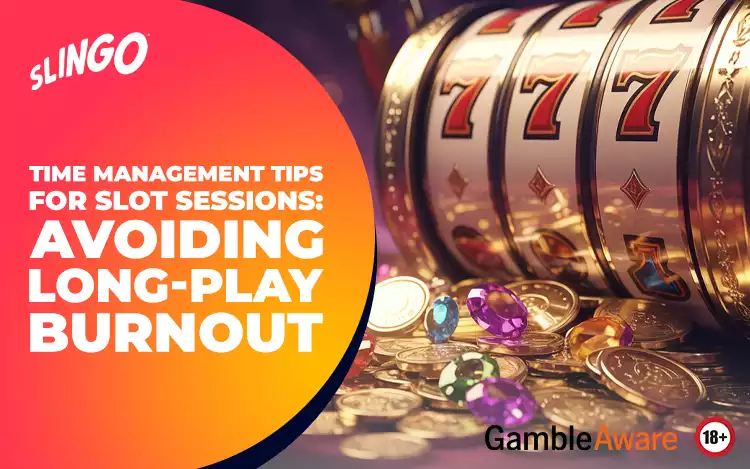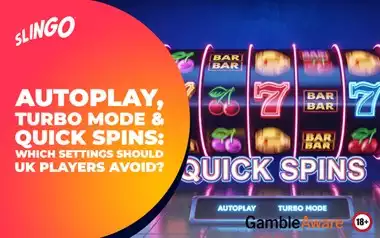Playing slot games is a fun pastime enjoyed by many. However, it is possible to get addicted to gambling, or to feel burnt out from too much time spent playing UK online slots (or other casino games).
One way to combat this is through time management, which is an important part of responsible gambling. By gambling responsibly and knowing when to take a break, you can stay in control of your gambling, your time and your finances.
Keep reading to learn how to avoid reel fatigue during extended play, and how to manage your gaming time effectively.
Why Time Management Matters in Online Slots
Time management is important in all aspects of life, but it can be particularly relevant when paying online slots. If you end up playing a slot game for an extended period of time, you might experience mental fatigue, sometimes called ‘burnout’. Playing slots can make you tired, but you may not realise it due to the excitement of the visuals and sound effects.
Playing slots requires some brainpower, including when to adjust bets, and the highs and lows experienced in a gaming session can also be exhausting.
It can be difficult to notice the signs of slot burnout or mental fatigue, particularly in yourself. However, if you’re feeling drained during or after playing, making rash decisions or feeling irritable or restless, you could be experiencing burnout.
Set Limits Before You Start
One of the best ways to gamble responsibly and avoid burnout is by setting limits before you start playing – and sticking to them. You can choose which type of limit to set – it could be time-based, spend-based or spin-based.
For example, you might decide that you’re only going to play for 20 minutes. Or perhaps you’ll only play once a day, once a week, or whatever you decide is responsible. Once that time is up, close the game and log out of your account.
Slingo’s Reality Check tool (otherwise known as a Game Status Reminder) can help here. You can find it in the My Account section of the website, and you can set it to appear at regular intervals to tell you how long you have been playing for and give you options to continue playing, review your game history, or close the game.
You can also decide how frequently you would like the Game Status Reminder to appear. This is a helpful way to keep yourself in check and notice if you might have been playing for too long.
Or you might decide to set a budget limit. Once you’ve spent the allocated funds, it’s time to stop - no more deposits or playing over the limit! Or you could even decide that you’ll stop playing after a certain number of spins.
If you’re finding it hard to stick to your limits, tell a friend or family member so that they can check in with you and help you keep to your limits. If you feel like your gambling is becoming a problem, you can call the National Gambling Helpline. They’re open 24 hours a day, seven days a week, and you can chat to them on WhatsApp or live chat too.
Take Regular Breaks
It’s also important to take regular gaming breaks. You can figure out a frequency that works for you, although we’d advise taking a five to ten-minute break every 30 – 45 minutes. Take a proper break from screens when you do it – don’t just start scrolling Instagram! Making a cup of tea or going for a walk around the block are both great ways to reset, and to give your eyes a break from screen time.
Taking regular breaks can reset your focus and bring your playing session into perspective. You might reflect on your wins or losses so far, and be able to see more clearly if it’s time to stop playing. Giving your brain a rest can also help you to focus on what’s important, or think about other tasks you need to do during the day. It removes the focus away from the game, and can help you to gain perspective on your gaming session and your finances.
Recognise When to Stop
When playing slots, it’s tempting to think ‘Just one more spin…’, even after you’ve said you’ll stop. This is because we naturally have a tendency to believe that we are ‘due a win’ if we haven’t had one for a while. However, it’s crucial to remember that all slot outcomes are due to chance. The slot game does not have a memory, and each spin is independent of the one that came before it. Outcomes are determined randomly, using a Random Number Generator (RNG) that is tested for fairness, and cannot be predicted.
A quick way to spot whether a session has gone on too long is if you notice yourself repeatedly thinking ‘just one more spin!’ This kind of thinking isn’t healthy, and it’s important to know when to stop to prevent burnout.
Other signs include noticing whether you’re still having fun. If you’re not, you should stop playing.
If you’ve lost track of time, you’re feeling emotional or stressed, or you know that you’ve exceeded your budget or time limits, it’s time to end your gaming session.
Tools and Features That Can Help UK Players
There are lots of responsible gambling tools on UK-licensed sites like Slingo that are designed to help you stay in control. We’ve already mentioned Reality Checks, so here are a couple more:
Slingo Play Controls
In any Slingo game, you’ll be able to select ‘Play Controls’ from the burger menu (the three horizontal lines that look like a burger if you use your imagination).
You can use Play Controls to set the number of extra spins, the maximum extra spin price, the total single game stake and limit the total single game loss.
As soon as you reach the limits you set while playing the game, a message will pop up saying ‘Limit Reached’ and informing you that the game will now end and any winnings will be collected. Clicking ‘OK’ will end the game.
SafeMate
SafeMate is a useful new tool in the Responsible Gambling section of your account. It allows you to track how much money you have spent, what you have won or lost, and how much time you have spent gambling over the last six months.
You can use it to see whether your gambling habits are changing, and it can even compare you to other similar players and give you a gambling health check score.
Tips for Staying in Control During Slot Play
To help you stay in control, we recommend having a routine that you follow during every gaming session. At the beginning of the session, set your limits. Perhaps you’ll only play for 20 minutes, or you’ll only spend a certain amount.
It's also a good idea to play in short bursts – this could be 20 minutes at a time – and then have a five to ten-minute break. This helps you to regularly step away from the gaming session and put things into perspective. Check out our blog for tips on choosing the right volatility for a shorter session.
Don’t do other activities while gaming – for example, watching TV at the same time – since this means you will be less focused on what’s happening on the reels. Don’t use autoplay for long stretches of time, since you may lose track of how much you are spending.
Bonus: Setting Realistic Goals for Sessions
Part of responsible gambling is setting realistic goals for your gaming sessions. The focus should always be on having fun – not on how much money you hope to win. As we explained earlier, the outcomes of slot games are completely random and cannot be predicted. This means that there is no sense in chasing wins - this means continuing to play because you believe that you are ‘due a win’.
Throughout the session, check in with yourself. If you’re no longer having fun, or you feel like you’re focusing too much on what you could win, it’s time to take a break.
Gamble Responsibly and Safely at Slingo
Play all the latest titles at Slingo – a safe, secure online casino with all the freshest games. Choose from over 6,000 slot games, including Slingo, slots and live casino games at our easy-to-use site, whether you’re on desktop or mobile. Take advantage of our exclusive welcome bonus for new players and get 133 free spins when you sign up (min. £10 deposit). Always play responsibly, and never spend more than you can afford to lose. If you’re feeling burnt out, take a break and come back refreshed – it’s more fun that way.









